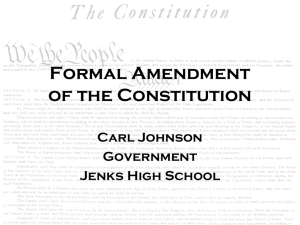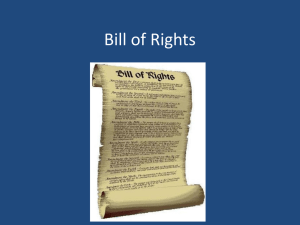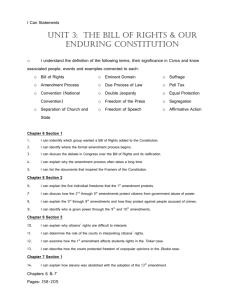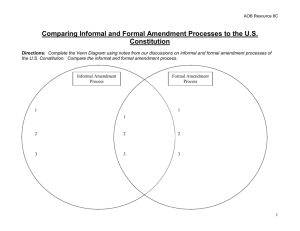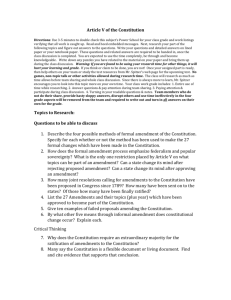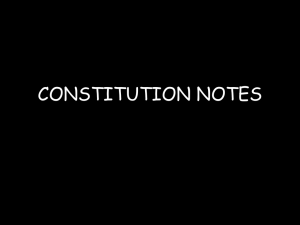chapter 3 review
advertisement
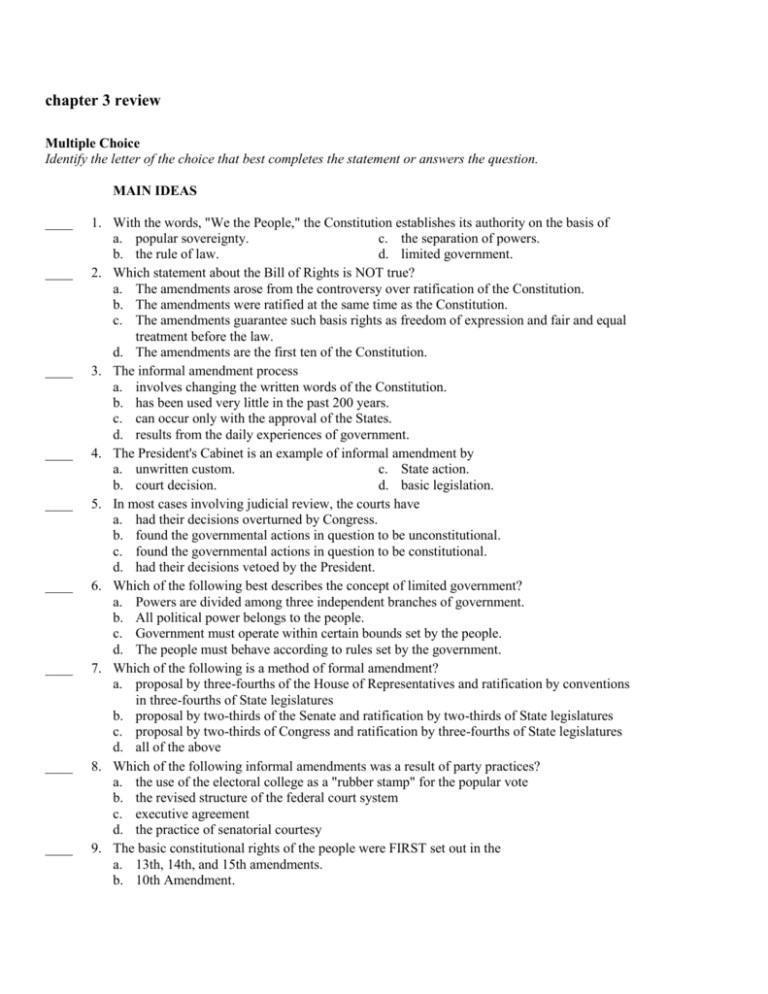
chapter 3 review Multiple Choice Identify the letter of the choice that best completes the statement or answers the question. MAIN IDEAS ____ ____ ____ ____ ____ ____ ____ ____ ____ 1. With the words, "We the People," the Constitution establishes its authority on the basis of a. popular sovereignty. c. the separation of powers. b. the rule of law. d. limited government. 2. Which statement about the Bill of Rights is NOT true? a. The amendments arose from the controversy over ratification of the Constitution. b. The amendments were ratified at the same time as the Constitution. c. The amendments guarantee such basis rights as freedom of expression and fair and equal treatment before the law. d. The amendments are the first ten of the Constitution. 3. The informal amendment process a. involves changing the written words of the Constitution. b. has been used very little in the past 200 years. c. can occur only with the approval of the States. d. results from the daily experiences of government. 4. The President's Cabinet is an example of informal amendment by a. unwritten custom. c. State action. b. court decision. d. basic legislation. 5. In most cases involving judicial review, the courts have a. had their decisions overturned by Congress. b. found the governmental actions in question to be unconstitutional. c. found the governmental actions in question to be constitutional. d. had their decisions vetoed by the President. 6. Which of the following best describes the concept of limited government? a. Powers are divided among three independent branches of government. b. All political power belongs to the people. c. Government must operate within certain bounds set by the people. d. The people must behave according to rules set by the government. 7. Which of the following is a method of formal amendment? a. proposal by three-fourths of the House of Representatives and ratification by conventions in three-fourths of State legislatures b. proposal by two-thirds of the Senate and ratification by two-thirds of State legislatures c. proposal by two-thirds of Congress and ratification by three-fourths of State legislatures d. all of the above 8. Which of the following informal amendments was a result of party practices? a. the use of the electoral college as a "rubber stamp" for the popular vote b. the revised structure of the federal court system c. executive agreement d. the practice of senatorial courtesy 9. The basic constitutional rights of the people were FIRST set out in the a. 13th, 14th, and 15th amendments. b. 10th Amendment. ____ 10. ____ 11. ____ 12. ____ 13. ____ 14. ____ 15. ____ 16. ____ 17. ____ 18. ____ 19. ____ 20. c. Bill of Rights. d. Equal Rights Amendment. Which of the following is NOT true of the use of executive agreement? a. It extends the President's power through the informal amendment process. b. It carries the same legal force as a treaty. c. It can be used to avoid the lengthy treaty-making process. d. It is among the executive powers listed in Article II of the Constitution. The legislative branch can check the judicial branch by its power to a. name federal judges. b. remove judges through impeachment. c. declare executive actions unconstitutional. d. override a presidential veto. Which of the following is the subject of a constitutional amendment? a. the prohibition of alcohol b. repeal of a previous amendment c. presidential term limits d. all of the above The Judiciary Act of 1789 was an example of a. a formal amendment to the Constitution. b. Congress informally amending the Constitution. c. an executive agreement. d. an informal amendment by court decision. The President's power to veto an act of Congress is an example of a. executive agreement. c. checks and balances. b. judicial review. d. limited government. Which of the following accounts for the ability of the Constitution to endure for more than 200 years? a. built-in provisions for accommodating change b. detailed provisions that anticipated changing customs c. very specific language that limits reinterpretation d. inflexible provisions designed to resist change According to Article V of the Constitution, no amendment may a. deprive a State of its equal representation in the Senate. b. abolish the protections guaranteed in the Bill of Rights. c. deny people the right to vote because of race, color, or gender. d. reestablish slavery or other forms of involuntary servitude. The Bill of Rights guarantees all of the following EXCEPT a. fair treatment before the law. c. freedom of expression. b. the right of women to vote. d. freedom of belief. Which of the following is mentioned by the Constitution and its amendments? a. succession of Vice President to presidency b. political parties c. custom of senatorial courtesy d. the President's Cabinet Which of the following is NOT an example of the checks and balances system? a. The President makes an executive agreement. b. The Supreme Court declares a law passed by Congress to be unconstitutional. c. The President vetoes a bill. d. The Senate approves the President's nominee for Supreme Court justice. When there is a separation of powers, ____ 21. ____ 22. ____ 23. ____ 24. ____ 25. ____ 26. ____ 27. a. power is divided between the National Government and the States. b. power is distributed among three independent branches of government. c. the people grant the States the authority to govern. d. the basic powers of government are held by a single agency. Which of the following is NOT true of the Constitution? a. It sets guidelines within which the government must operate. b. It is open to interpretation. c. It has not been changed in 50 years. d. It is the highest form of law in the United States. Each of the four methods of formal amendment a. can proceed only with the approval of the President. b. demonstrates the principle of federalism. c. involves unwritten changes in the interpretation of the Constitution. d. is undertaken jointly by the executive, legislative, and judicial branches. Congress can informally amend the Constitution by a. passing basic legislation. b. adding meaning to skeletal portions of the Constitution. c. simply exercising many of its powers. d. all of the above. One criticism of the formal amendment process is that a. the Framers did not intend for the words of the Constitution to be changed. b. the process is too short and, therefore, too many amendments are approved. c. the judicial branch cannot propose an amendment. d. State legislatures, rather than convention delegates elected by the people, often ratify amendments. Which of the following was formally amended to the Constitution? a. equality of rights for women c. prohibition of child labor b. prohibition of alcoholic beverages d. balanced federal budget Which of the following statements about informal amendments is TRUE? a. They may only originate with the President, Congress, or the courts. b. Some have been proposed and ratified as formal amendments. c. Most must be approved by State legislatures or conventions. d. They cannot be made through customs. Which of the following amendments was ratified FIRST? a. the amendment lowering the voting age to 18 b. the amendment ending slavery c. the amendment guaranteeing freedom of speech d. the amendment allowing Congress to tax incomes Matching IDENTIFYING KEY TERMS Match each item with the correct statement below. You will not use all the terms. a. amendment b. Bill of Rights c. checks and balances d. constitutionalism e. article f. rule of law g. separation of powers ____ 28. A(n) ____ is a way to change the Constitution. ____ 29. The government and its officers must obey the ____, which is another way of describing the concept of limited government. ____ 30. A(n) ____ is one of the seven numbered sections of the Constitution. ____ 31. The system of ____ helps keep one branch of government from dominating the actions of the others. ____ 32. The Constitution provides for the ____ by creating three distinct branches of government: legislative, executive, and judicial. IDENTIFYING KEY TERMS Match each item with the correct statement below. You will not use all the terms. a. checks and balances b. Bill of Rights c. executive agreement d. formal amendment e. judicial review f. unconstitutional ____ ____ ____ ____ 33. 34. 35. 36. A(n) ____ carries the same force of law as a treaty. A governmental action that denies someone fair and equal treatment under the law may be declared ____. The first ten amendments are called the ____. Changes to the written provisions of the Constitution may be made only through the process of ____. Short Answer INTERPRETING DIAGRAMS Use the diagram to answer the following questions. 37. Which branch of government can declare an act of Congress to be unconstitutional? 38. What powers do the President and Congress have over the appointment of Supreme Court justices? 39. Which branch of government can override a presidential veto? 40. How may Congress check a presidential veto? 41. How can the judicial branch check executive actions? 42. Name the one way that the executive branch can check the power of the judicial branch. Essay CRITICAL THINKING 43. Making Comparisons How do the formal and informal amendment processes compare as expressions of popular sovereignty? 44. Drawing Conclusions When Franklin Roosevelt broke the "no-third-term" tradition, did he violate the Constitution? Explain your answer. 45. Drawing Conclusions If a proposed amendment violates the Constitution, should the Supreme Court be able to block its ratification? Explain. 46. Determining Relevance How is the constitutional principle of federalism reflected in the formal amendment process? Other IDENTIFYING KEY TERMS Use each key term in a sentence that shows the meaning of the term. 47. unconstitutional 48. federalism 49. informal amendment 50. constitutionalism 51. checks and balances 52. Preamble chapter 3 review Answer Section MULTIPLE CHOICE 1. 2. 3. 4. 5. 6. 7. 8. 9. 10. 11. 12. 13. 14. 15. 16. 17. 18. 19. 20. 21. 22. 23. 24. 25. 26. 27. A B D A C C C A C D B D B C A A B A A B C B D D B B C MATCHING 28. 29. 30. 31. 32. A F E C G 33. 34. 35. 36. C F B D SHORT ANSWER 37. judicial branch 38. The president has the power to appoint justices. Congress has the power to approve or reject the President's appointees. 39. legislative branch 40. override the veto with a two-thirds vote 41. It has the power to declare executive actions unconstitutional. 42. through its power to appoint federal judges ESSAY 43. Some students might think the formal amendment process better expresses popular sovereignty because the people can elect people to ratifying conventions or legislators they have chosen will be part of the ratifying process. They might argue that informal amendment processes are results of government actions not directly reflecting the people's opinions such as in the case of executive agreements. Other students might think that informal amendments are better expressions of popular sovereignty because they arise out of issues directly related to the people. For example, customs such as the "no-third-term tradition" are not only established by the government but also by the people. On the other hand, people do not usually elect legislators based on their stance on an amendment and conventions are not always called. 44. Roosevelt did not violate the law. No written provisions of the Constitution spelled out the number of terms a President may serve—it was left to the popular wisdom to determine, either formally or informally. Informal amendments do not necessarily carry the same force of law as formal amendments, as the public learned. By ratifying the 22nd Amendment, they turned the weight of custom—the no-third-term tradition—into law. 45. No. The formal amendment process is a part of the Constitution—the express will of the people—which the Supreme Court is obliged to obey. Blocking ratification of a proposed amendment—in fact, any kind of interference with the formal amendment process—would itself be unconstitutional. Moreover, the fact that a proposed amendment violates existing provisions of the Constitution is not relevant to its legitimacy. By ratifying such a "violation," or change, the people would simply be updating the expression of their will, which is sovereign. 46. The fact that action is required at both the national and State levels by either of the two methods of formal amendment described in Article V reflects the principle of federalism—the division of power between the central and regional governments. Only Congress or a National Convention called by Congress (at the States' request) has the power to propose an amendment. Ratification can only occur at the State level, either by the State legislatures or by special State conventions. OTHER 47. Possible sentence: A government action is unconstitutional if it violates a provision in the Constitution. 48. Possible sentence: Because of the system of federalism in the United States, power is distributed between the National Government and the 50 States. 49. Possible sentence: Informal amendments, while not written, account for most of the changes in the interpretation and application of constitutional provisions. 50. Possible sentence: If it disobeyed its own fundamental body of law, the government could hardly claim to be a model of constitutionalism. 51. Possible sentence: The system of checks and balances helps keep government running on the basis of compromise rather than confrontation. 52. Possible sentence: The Preamble is the introduction to the Constitution.

